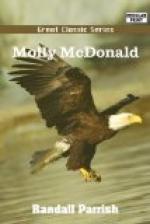He came to the little patch of forest growth, a dozen gaunt, naked trees at the river’s edge, stunted, two of them already toppling over the bank, apparently undermined by the water, threatening to fall before each blast that smote them. Hoping to discover some splinters for a fire, Hamlin kicked a clear space in the snow, yet kept his face always toward the bluff, his eyes vigilantly searching for any skulking figure. Silent as those desert surroundings appeared, the Sergeant knew he was not alone. He had a feeling that he was being watched, spied upon; that somewhere near at hand, crouching in that solitude, the eyes of murder followed his every movement. Suddenly he straightened up, staring at the bluff nearly opposite where he stood. Was it a dream, an illusion, or was that actually the front of a cabin at the base of the bank? He could not believe it possible, nor could he be sure. If so, then it consisted merely of a room excavated in the side of the hill, the opening closed in by cottonwood logs. It in no way extended outward beyond the contour of the bank, and was so plastered with snow as to be almost indistinguishable a dozen steps away. Yet those were logs, regularly laid, beyond a doubt; he was certain he detected now the dim outlines of a door, and a smooth wooden shutter, to which the snow refused to cling, the size and shape of a small window. His heart throbbing with excitement, the Sergeant slipped in against the bluff for protection, moving cautiously closer until he convinced himself of the reality of his strange discovery by feeling the rough bark of the logs. It was a form of habitation of some kind beyond question; apparently unoccupied, for there were no tracks in the snow without, and no smoke of a fire visible anywhere.
CHAPTER XXVII
HUGHES’ STORY
Hamlin thrust his glove into his belt, drew forth his revolver, and gripped its stock with bare hand. This odd, hidden dwelling might be deserted, a mere empty shack, but he could not disconnect it in his mind from that murderous attack made upon their little party two hours before. Why was it here in the heart of this desert? Why built with such evident intent of concealment? But for what had occurred on the plateau above, his suspicions would never have been aroused. This was already becoming a cattle country; adventurous Texans, seeking free range and abundant water, had advanced along all these prominent streams with their grazing herds of long-horns. Little by little they had gained precarious foothold on the Indian domains, slowly forcing the savages westward. The struggle had been continuous for years, and the final result inevitable. Yet this year the story had been a different one, for the united tribes had swept the invading stockmen back, had butchered their cattle, and once again roamed these plains as masters. Hamlin knew this; he had met and talked with those driven out, and he was aware that even now Black Kettle’s winter camp of hostiles was not far away. This hut might, of course, be the deserted site of some old cow camp, some outrider’s shack, but—the fellow who fired on them! He was a reality—a dangerous reality—and he was hiding somewhere close at hand.




